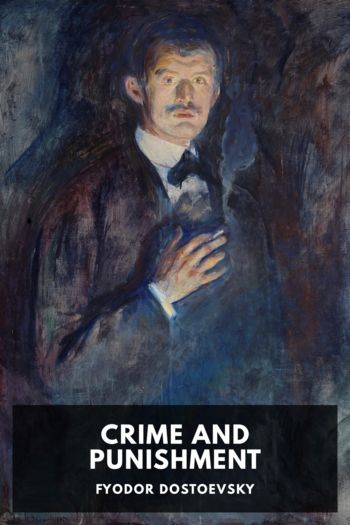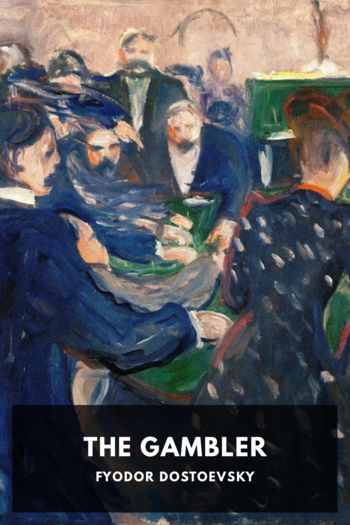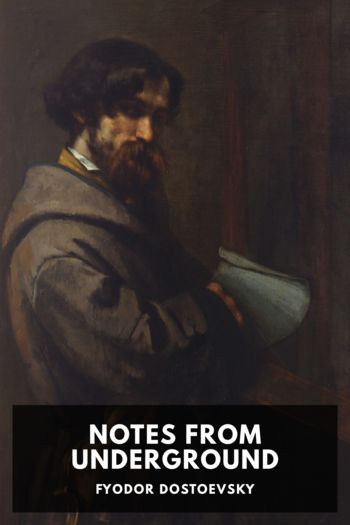Crime and Punishment by Fyodor Dostoevsky (love novels in english TXT) 📕

- Author: Fyodor Dostoevsky
Book online «Crime and Punishment by Fyodor Dostoevsky (love novels in english TXT) 📕». Author Fyodor Dostoevsky
“I tell you what,” cried Raskolnikov, raising himself on his pillow and fixing his piercing, glittering eyes upon him, “I tell you what.”
“What?” Luzhin stood still, waiting with a defiant and offended face. Silence lasted for some seconds.
“Why, if ever again … you dare to mention a single word … about my mother … I shall send you flying downstairs!”
“What’s the matter with you?” cried Razumihin.
“So that’s how it is?” Luzhin turned pale and bit his lip. “Let me tell you, sir,” he began deliberately, doing his utmost to restrain himself but breathing hard, “at the first moment I saw you you were ill-disposed to me, but I remained here on purpose to find out more. I could forgive a great deal in a sick man and a connection, but you … never after this …”
“I am not ill,” cried Raskolnikov.
“So much the worse …”
“Go to hell!”
But Luzhin was already leaving without finishing his speech, squeezing between the table and the chair; Razumihin got up this time to let him pass. Without glancing at anyone, and not even nodding to Zossimov, who had for some time been making signs to him to let the sick man alone, he went out, lifting his hat to the level of his shoulders to avoid crushing it as he stooped to go out of the door. And even the curve of his spine was expressive of the horrible insult he had received.
“How could you—how could you!” Razumihin said, shaking his head in perplexity.
“Let me alone—let me alone all of you!” Raskolnikov cried in a frenzy. “Will you ever leave off tormenting me? I am not afraid of you! I am not afraid of anyone, anyone now! Get away from me! I want to be alone, alone, alone!”
“Come along,” said Zossimov, nodding to Razumihin.
“But we can’t leave him like this!”
“Come along,” Zossimov repeated insistently, and he went out. Razumihin thought a minute and ran to overtake him.
“It might be worse not to obey him,” said Zossimov on the stairs. “He mustn’t be irritated.”
“What’s the matter with him?”
“If only he could get some favourable shock, that’s what would do it! At first he was better. … You know he has got something on his mind! Some fixed idea weighing on him. … I am very much afraid so; he must have!”
“Perhaps it’s that gentleman, Pyotr Petrovitch. From his conversation I gather he is going to marry his sister, and that he had received a letter about it just before his illness. …”
“Yes, confound the man! he may have upset the case altogether. But have you noticed, he takes no interest in anything, he does not respond to anything except one point on which he seems excited—that’s the murder?”
“Yes, yes,” Razumihin agreed, “I noticed that, too. He is interested, frightened. It gave him a shock on the day he was ill in the police office; he fainted.”
“Tell me more about that this evening and I’ll tell you something afterwards. He interests me very much! In half an hour I’ll go and see him again. … There’ll be no inflammation though.”
“Thanks! And I’ll wait with Pashenka meantime and will keep watch on him through Nastasya. …”
Raskolnikov, left alone, looked with impatience and misery at Nastasya, but she still lingered.
“Won’t you have some tea now?” she asked.
“Later! I am sleepy! Leave me.”
He turned abruptly to the wall; Nastasya went out.
VIBut as soon as she went out, he got up, latched the door, undid the parcel which Razumihin had brought in that evening and had tied up again and began dressing. Strange to say, he seemed immediately to have become perfectly calm; not a trace of his recent delirium nor of the panic fear that had haunted him of late. It was the first moment of a strange sudden calm. His movements were precise and definite; a firm purpose was evident in them. “Today, today,” he muttered to himself. He understood that he was still weak, but his intense spiritual concentration gave him strength and self-confidence. He hoped, moreover, that he would not fall down in the street. When he had dressed in entirely new clothes, he looked at the money lying on the table, and after a moment’s thought put it in his pocket. It was twenty-five roubles. He took also all the copper change from the ten roubles spent by Razumihin on the clothes. Then he softly unlatched the door, went out, slipped downstairs and glanced in at the open kitchen door. Nastasya was standing with her back to him, blowing up the landlady’s samovar. She heard nothing. Who would have dreamed of his going out, indeed? A minute later he was in the street.
It was nearly eight o’clock, the sun was setting. It was as stifling as before, but he eagerly drank in the stinking, dusty town air. His head felt rather dizzy; a sort of savage energy gleamed suddenly in his feverish eyes and his wasted, pale and yellow face. He did not know and did not think where he was going, he had one thought only: “that all this must be ended today, once for all, immediately; that he would not return home without it, because he would not go on living like that.” How, with what to make an end? He had not an idea about it, he did not even want to think of it. He drove away thought; thought tortured him. All he knew, all he felt was that everything must be changed “one way or another,” he





Comments (0)